- Home
- Cecelia Ahern
Roar Page 9
Roar Read online
Page 9
The restaurant door opens and a woman steps inside. Elegant, pretty, flustered because she’s late, shaking out an umbrella, complaining of the traffic due to the road accident. Max looks at the woman who can’t remember her name hopefully, and she sees that he truly cares that she remembers her name. He’s hoping that she knows. She smiles.
As soon as she sees that woman’s face, everything comes to her in an instant.
Her own name comes to her immediately, but of course it would, this is the first woman to ever hold her, to comfort her, to kiss her, to say her name, to give her her name.
‘Hi, Mom.’ She stands up, opening her arms for an embrace.
The woman inherited the watch from her Aunt Crystal; a beautiful gold seashell locket containing a clock with a pearl face inside. She remembers the locket nestling in the crack of her aunt’s generous boobs. As a child she would sit on her aunt’s knee, captivated, opening and closing the locket, believing her aunt’s story that there was magic inside.
Crystal had given it to her in the weeks before she passed away, telling her that she had no need for the timepiece now that her time was nearing its end. Her aunt lived alone all of her life, never married, never had children, and if she had ever loved a man, the woman had never met him. Crystal had always said that these were things she wanted but that the timing had never been right. It drifted away and passed her by.
The same timepiece that had hung around her aunt’s neck for most of her life and had nestled itself in her bosom close to her heart, like a mussel clinging to a rock, now sits against the woman’s skin, next to her heartbeat.
Thirty-seven years old, she hears the clock ticking louder now than it ever did before. It’s so loud it keeps her awake as she watches her sleeping boyfriend with his head covered, wondering when things between them will change, when they can take things to the next level, how she can bring it up without sending him into another tailspin that sees him out late again and coming home smelling of booze and bumping into doorframes. He’s happy as things are, and so is she, and yet … there is no clock around his neck, no finger prodding his ribs.
She lies awake at night, restless, seashell in her hand, feeling the vibration. Had she imagined it or had the ticking gotten louder when having coffee with her friends and their babies? All new young mothers on maternity leave, she’s the only one left who hasn’t had children.
Tick. Tick. Tick.
‘What is that noise?’ her friend had asked, looking around manically.
‘I was wondering the same thing,’ her other friend says, her nipple in the mouth of a chubby-cheeked babe. Fatigue-ringed eyes, both look around, then land on her.
‘Is that ticking coming from you?’
She had tucked her seashell inside her cashmere sweater, hoping that it would absorb the sound. It had helped a little but thankfully her friends had been so distracted with their children they hadn’t investigated further.
The volume of the ticking had risen again during her interview for a promotion to senior-level archivist at the library. She hadn’t been the only one who heard it. They were in a grand wood-panelled room, marble floor and high ceilings, tall windows and lots of light to glaze the dark wooden surfaces, to illuminate the dust particles in its path. Hard surfaces, empty spaces, perfect acoustics for sounds to reverberate around the room.
‘You know that this work will require more hours?’ one interviewer behind the boardroom table had asked.
‘Yes, of course.’
Tick. Tick. Tick.
‘You’ll be responsible for bidding for funds and managing budgets, supervising the staff. You’ll be responsible for the overall strategy. More responsibility,’ another had chimed in.
‘Yes, of course.’ She knew what they were really asking. A team of men wouldn’t want to hire a woman who had to suddenly take maternity leave. But she wanted this job and she wanted to have a baby. She wanted both but she physically needed one thing more.
TICK. TICK. TICK.
He’d had to raise his voice to be heard over the ticking originating from around her neck, loud even when tucked under three layers of clothes; it had bounced off every hard surface. They had wrapped up the interview quickly.
She thinks of all this while lying in bed, watching her boyfriend’s pillow-covered face, opening and closing the clasp of the seashell.
‘I can’t do this any more!’ her boyfriend suddenly yells, which startles her. He throws the pillow from his face across the room and stands up naked in front of her.
She thought he’d been asleep, but he’s wide awake, pupils dilated with some kind of manic rage, chest heaving up and down as though he’s been running.
‘Henri,’ she says, her voice low and scared. ‘What are you doing?’
‘I can’t do this, I can’t.’
‘Do what? I’m not asking you to do anything?’
‘No, but I can feel it. I can hear it.’ He points to the clock around her neck. ‘It feels like someone is standing behind me, reading over my shoulder, breathing down my neck, all of the time. I can’t shake it off. I’m not ready for a baby. I’m not where you are yet. I don’t know if I ever will be.’
She stares at him in surprise, though she truly shouldn’t feel surprised, she should have known it was coming. He can’t leave her, she thinks. They have put three years into this relationship, three long years, and if he leaves it will take another three years to find someone else, to get to this point. She works out the timing in her head. Recovering from the loss of Henri, healing her heartbreak, ready to date again, finding the right person, committing, settling down. It will all take too much time. She doesn’t have time. He can’t leave.
Suddenly Henri roars and she looks at him, his hands are pressed hard against his ears, the ticking is so loud she can barely hear him yell but she can see the veins pulsating in his neck and his flared nostrils. He’s holding his head as though he has a migraine, as though the ticking has reached inside him.
‘Take the batteries out,’ she lip-reads his words.
‘I can’t!’ she shakes her head, grasping the clock even tighter.
He makes a move to grab it from her neck and she jerks back.
‘I won’t!’ she yells. Taking the battery out would be like losing Crystal all over again. This ticking clock is like her aunt’s beating heart. She can’t stop it. But she can’t quite explain this thinking, in the moment. The sound is too loud, he is so panicked, and she is confused.
‘It was a gift, Henri!’
‘It’s a curse!’ he yells. ‘It’s me or the clock,’ he stares at her, deep brown eyes searing into hers.
‘Both!’ she replies.
‘You can’t have both.’ He shakes his head, starting to get dressed.
She watches as he throws clothes into a bag. She is powerless to do anything, to say anything, all she can do is think about the wasted days and years, the time she has invested in him, hoping, praying that he could be the one; not in a spiritual sense but the one who will take the next step with her. The timing should be right. Three years, their ages. It should be now.
A baby. She wants a baby. Her body yearns for one, it aches. Her head is fine as things are, but something inside her yearns. It’s a hunger that can be fed only by food and a thirst that can only be quenched with water … this emptiness in her body, in her heart, in her womb, can only be filled with another life, a life that she has created and grown. Love from her lover is not enough, she does need more.
The absence of life inside her has taken on a life of its own and is growing by the day. Time is its feeder. She can’t ignore it. If she ignores it, because it’s inconvenient for someone else, then it will be too late. He doesn’t know what it’s like to live with regret for something that hasn’t yet happened. Fear, panic, that it’s all slipping away.
The ticking is so loud now that Henri has left that the police stop by the house – a neighbour filed a noise complaint. As soon as the police enter her home they too co
ver their ears with their hands. It’s unbearable.
The female police officer sits with her until the ticking quiets again. She has kind worried eyes, tired eyes. She talks in calming tones, she makes her camomile tea. They leave her sleeping on the couch with her seashell around her neck, cradled in her hand.
At work, assisting a team of students with research brings the woman to the floor of the library. Henri’s belongings are all gone from the apartment, she’s surrounded by gaps and spaces where he should be in both her home and her heart. She is exhausted and has barely slept a full night since he left. It’s been one month.
Tick, tick, tick.
She’s showing a girl how to use the equipment when she hears a sound that stops her mid-sentence.
Ticking. And it’s not from the seashell around her neck.
She looks around for the source. The prestigious grand library is quiet, low hushed voices, creaking, squeaking, coughing, throat-clearing, sneezing, nose-blowing, dragging of chair legs, footsteps, books being opened, dropped on the table, replaced on shelves.
As if in response to the faraway sound of ticking, her own seashell timepiece starts up. Her ticking and the mystery ticking are having a conversation. She holds onto it, using it as a compass to guide her. She runs her eyes over the students seated around the computers and it’s obvious the sound is from elsewhere. She leaves them, winds her way through quiet aisles of dusty bookshelves, her feet echoing on the marble floor. She follows the sound, and is misled as the ticking bounces off the walls, and shelves and marble floor and deceives her. As she gets closer, it gets louder, and her own necklace responds. They don’t tick in unison, they are individual, strong, getting louder.
Finally, after negotiating the labyrinth of books, she knows that the owner of the ticking clock is in the physics section, behind the shelving unit that separates them. There is nowhere left for the owner to go, this is the final corner. There is only one way in and out and the woman stands at the entrance, her heart thudding, its frenzy a contrast to her constant rhythmic ticking clock. Her clock is loud, so loud that whoever is behind the shelf must hear it too. It echoes around the quiet library.
‘Hello?’ she hears a man call out.
She steps out from behind the shelf and there he is. The owner of the ticking clock. She locates the watch on his wrist and then sees the book he is holding. Her breath catches in her throat. The Unreality of Time, Cambridge philosopher J.M.E. McTaggart’s study of time and change.
‘The B Theory,’ she says, breathless.
‘You’ve read it?’ he asks, surprised.
B theorists argue that the flow of time is an illusion, that the past, present and future are equally real and that time is senseless. Of course it is something that she has researched, she feels time all of the time, it is at the forefront of every moment. She wants to understand it.
‘You’re ticking,’ he says.
‘So are you,’ she replies.
‘It freaks most people out,’ he says, studying her intensely.
‘Not me.’
He’s the same as her. He wants the same thing.
Suddenly the rhythm of her ticking alters; she’s unsure whether hers slows or his speeds but there is some shifting of time. They both feel it, hers against her chest by her beating heart, his against the pulse in his wrist, until eventually their ticking is coordinated, in unison. Second by second, moment by moment, their ticking gradually quiets.
They both witness this miraculous shifting of time together; their ticking synchronized.
As quickly as a cloud passes overhead and the sky brightens, the anxiety lessens in her, and they both breathe a long and slow sigh of relief.
Finally.
Prairie Rock was about community, self-reliance and sustainability. One hundred homes in the neighbourhood on fifty acres. Organized around common areas, the households were each responsible for the upkeep of their area. The village had common orchards, vineyards, meadows and extra land where residents could rent garden space for themselves. When a property owner died, it fell to their remaining descendants to take responsibility for the resale of their home and land, which had to be approved by the community. At the same time, a plot of land became available from the many wild acres as a sign of respect to the departed, a plot of land that was otherwise uncultivated, waiting to come to life to assist the community. The idea was when you put the souls of your loved ones in the ground, the ground would come to life and provide. From death comes life.
She had been a communal dweller all of her life and with a small group of people to interact with, it could sometimes feel stifling. The same old faces, the same old arguments, though of course the familiarity was comforting, too. There was rarely a new face; when somebody died, their home usually passed on to a family member. It was rare for an outsider to be welcomed, one family in ten years so far. That was until Jacob the labourer had started working with them when her father became ill and they needed assistance with his share of the work on his land. Jacob was the first fresh face she had seen in some time.
It had practically been decided who she would marry when she was fourteen years old. She and Deacon had been friends since the first day of school. Born four days apart, played together, reared together, climbed every tree together, went out of bounds together, beyond the boundaries in every way they could. Explored and learned together. Her first friend, her first kiss, her first love.
When she was eighteen she’d married him. Their celebration had taken place in August, at the harvest party. Bridesmaids wore burnt orange, the table displays were straw and corn.
Her life was going just fine, an easy, unquestioned path that she was content to skip down. No children yet, but that was okay, they weren’t in any rush. Deacon had built their home on her parents’ land, helped out by his father and brothers. They had moved in one year ago. And just as they were settling and it felt like their life was beginning in a new direction, her mother became ill, and passed away. Very quickly after her mother died, her father fell ill and followed her. Both of them gone so quickly. And now she was left with her grief, and a pain in her chest. Her parents’ death had left a surprising hole that she never expected, and her clear head had all of a sudden clouded over.
Though she was a grown woman, she felt that she was here, in this community and on this earth, because of her parents. They were founders of the Prairie Rock community, pillars of their small but central society. Despite having her husband and the hope of building their own family, her parents were her roots, her foundation, and they’d been cut down. Without them, she felt as though she were hovering uncertainly above the ground. Even in the final few years when she cared for them, she’d still depended on them in a primal way. She had lost them within months of each other. She was relieved for her mother to be eased of her suffering, and relieved for her father to be reunited with his love, but after that came the unending sadness for herself. She knew to expect all this, but she never for a moment anticipated that she would feel so displaced without them. So wobbly, so uncertain, so filled with doubt about everything. She’d lost her backup.
The new thoughts scared her. The doubts were like stranglers wriggling around every single thought in her head, creeping in on every unrelated idea, an invader in her mind. A squatter in her head that stubbornly wouldn’t leave.
Like Jacob, who’d moved to Prairie Rock to assist them with her parents’ land. He lingered in her mind too. In almost every thought, like a shadow in a room. Always there, despite not being relevant. She couldn’t understand why his presence was so constant in her thoughts. She tried to shake him away but he wouldn’t leave. His eyes, brown and deep, seemed to see into her soul when he looked at her. She always looked away. But she always looked.
When a child of Prairie Rock community inherits the new plot of land – double acreage for her as both her parents had passed – it is up to that individual to decide what crop to sow. While it is her decision, she of course must bear in m
ind that it is to service the needs of the entire community. There are nightly meetings about various community issues but only one weekly gathering that everybody must attend. And it is here that she finds herself the centre of unwanted attention.
‘Fruit trees?’ A voice cuts into her thoughts. Barnaby, a man whose fingers are like roots to the earth.
‘Mmm,’ she replies, uncertain, as the faces watch her expectantly.
‘The land on the north is especially good for fruit, better sun too, might do better over there.’
‘We’re doing okay on the south, thank you very much,’ Harriet frowns.
‘You’re doing a fine job, Harriet, it’s the sun and the soil I’m thinking about,’ he reassures her.
This is an exciting moment for everybody. The woman’s sad loss is the village’s gain, something new to plant in honour of her parents, a real opportunity to introduce new produce to their diets.
‘I’ve heard about these almond orchards,’ Gladys suggests.
‘Bobby is already growing almond trees on his allotment,’ Barnaby explains softly.
‘Yes, but not enough.’
‘I think there’s enough for the community,’ Bobby says, slightly offended. ‘How many more almonds do we need?’
‘But there is so much more we can do – almond oil, almond butter, almond milk … so far we just eat almonds.’ Gladys looks around the group for support. Some are interested, some not. She shrugs. ‘It’s her decision.’
‘Mmm,’ the woman replies again.
‘What about prunes?’ Dorothy suggests and goes on yet another lecture about the value of prunes, everything they’ve been hearing since her doctor seems to have put her on a prune-only diet on account of her haemorrhoids. She’s like a new woman since prunes came into her life, one would think she had a new lover.
Jacob. He arrives in her mind. Standing in the corner, observing her.

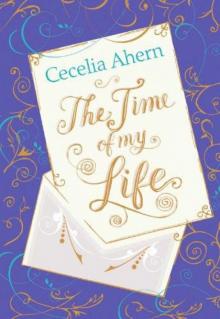 The Time of My Life
The Time of My Life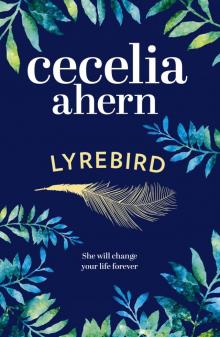 Lyrebird
Lyrebird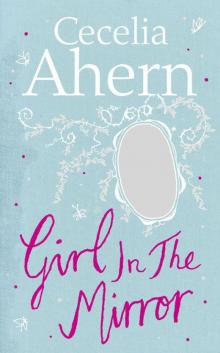 Girl in the Mirror
Girl in the Mirror Perfect
Perfect One Hundred Names
One Hundred Names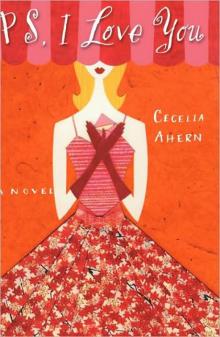 PS, I Love You
PS, I Love You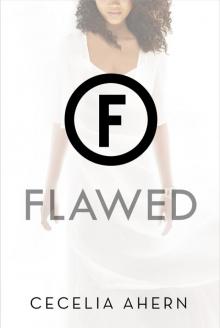 Flawed
Flawed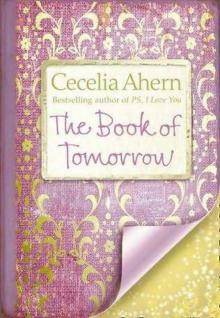 The Book of Tomorrow
The Book of Tomorrow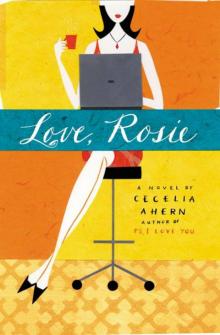 Love, Rosie
Love, Rosie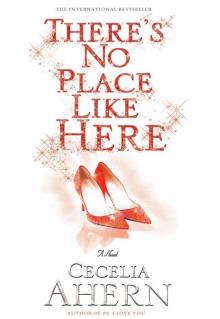 A Place Called Here
A Place Called Here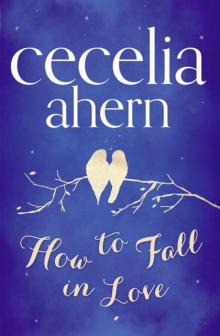 How to Fall in Love
How to Fall in Love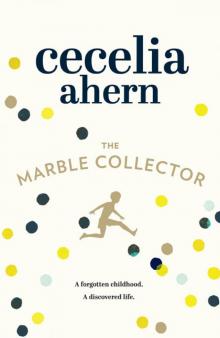 The Marble Collector
The Marble Collector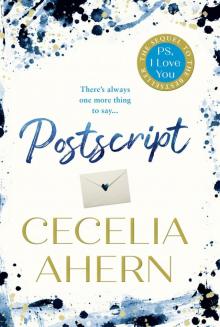 Postscript
Postscript The Gift
The Gift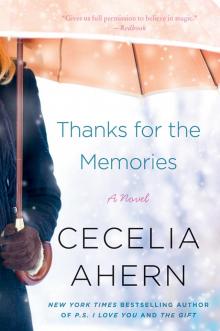 Thanks for the Memories
Thanks for the Memories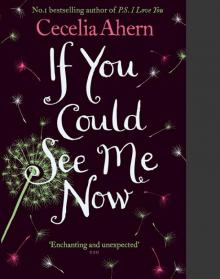 If You Could See Me Now
If You Could See Me Now Roar
Roar Cecelia Ahern 2-book Bundle
Cecelia Ahern 2-book Bundle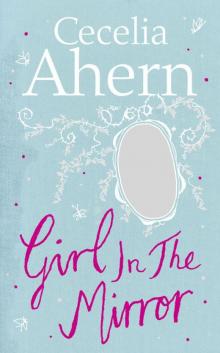 Girl in the Mirror: Two Stories
Girl in the Mirror: Two Stories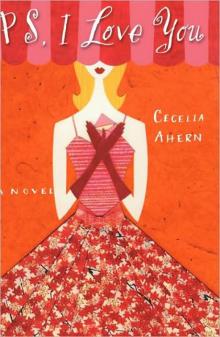 PS, I Love You: A Novel
PS, I Love You: A Novel Cecelia Ahern Short Stories
Cecelia Ahern Short Stories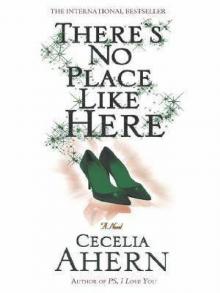 There’s No Place Like Here
There’s No Place Like Here